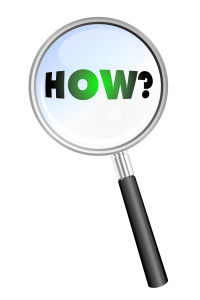In this article, let’s look at three simple and powerful questions that project managers should ask in every project, the what, why, and how of projects. Getting answers to these questions will greatly reduce risks to your projects and position you and your teams for success.
3 Key Project Questions
1. The What Question
The center point of every project is the goal or goals. The key question is: What is the project team trying to achieve? Are we creating a new product or service? Are we modifying existing products or services? When we implement the project, how will the organization be in a better position to meet the strategic objectives?
 As we write the project goals, make sure each goal is clear. Consider writing SMART goals.
As we write the project goals, make sure each goal is clear. Consider writing SMART goals.
Sometimes I see a goal like this one: “To improve customer service.”
What’s wrong with this goal? The goal lacks specificity. It’s not measurable. It has no deadline.
Here’s another goal: “To improve claims cycle time.”
How could we improve this goal?
- Specify whether you wish to increase, decrease or maintain the cycle time
- Specify the line of business such as private-passenger auto
- Specify how much
- Specify a deadline
Here’s the revised goal:
“To decrease the private passenger auto claims cycle time from the current average of 12 days to an average of 8 days by 12/31/xx.”
2. The Powerful Why Question
The emotional element of projects is rooted in the why question. Here we are addressing the question: Why are we undertaking this project? You can tell your team members what to do every day, but until they understand why, your team members will lack motivation. Fuel your project team with clarity on why the project is being undertaken.
 Here’s a simple exercise I suggest you try. Stop a few of your project members one-on-one and ask this question: Why are we doing this project? You may be shocked at the different responses.
Here’s a simple exercise I suggest you try. Stop a few of your project members one-on-one and ask this question: Why are we doing this project? You may be shocked at the different responses.
How is it possible for people to work on the same project for months and yet have different ideas about the purpose of the project? The lack of congruence is often due to a lack of communication early in the project.
Want to improve communication in your projects? Consider the following tips:
- Work closely with the project sponsor and key stakeholders to clarify why the project is being undertaken. Clarify how the project supports the organization’s strategy.
- Document why the project is being undertaken in the project charter.
- Have a project kick-off meeting. Have the sponsor share why the project is important.
People lose their way when they lose their why.” –Michael Hyatt
Communication problems may occur as changes occur on our project team. Team members may be removed from our team, and new team members may be added. Meet with your new team members and review the project charter. Make sure every member understands the project goals and how each team member will contribute to the achievement of the goals.
The What, Why, & How of Powerful Project Charters. Weak foundations lead to challenging projects; some projects collapse. In this course – The What, Why, & How of Powerful Project Charters, I walk you through — step by step — how to create powerful project charters quickly. Learn to engage your stakeholders early and build a solid foundation.
3. The How Question
 We know what we are doing and we know why we are doing it. Now, we are in the right position to ask the final question: How will we complete our work? In simple terms, we are determining who will do what and when each task will be completed.
We know what we are doing and we know why we are doing it. Now, we are in the right position to ask the final question: How will we complete our work? In simple terms, we are determining who will do what and when each task will be completed.
Think about the project lifecycle. Will you and your team use a predictive, traditional lifecycle such as the waterfall lifecycle? Will the team use a change-driven, agile approach?
Starting, Sustaining, and Recovering Projects
Whether you are initiating a project, or you are in the middle of your project, consider these questions:
- What is the project team trying to achieve?
- Why are we undertaking the project?
- How will we complete our work?
If things just don’t feel right in the project, these questions can help you get better definition and alignment between you, your sponsor, your team, and your stakeholders.
Is your project in a meltdown and drowning in uncertainty? These questions can jumpstart a troubled project. Use these simple questions to test the foundational elements of the project. Answering these questions will help release you from the quicksand and put you and your team back on track for success.
